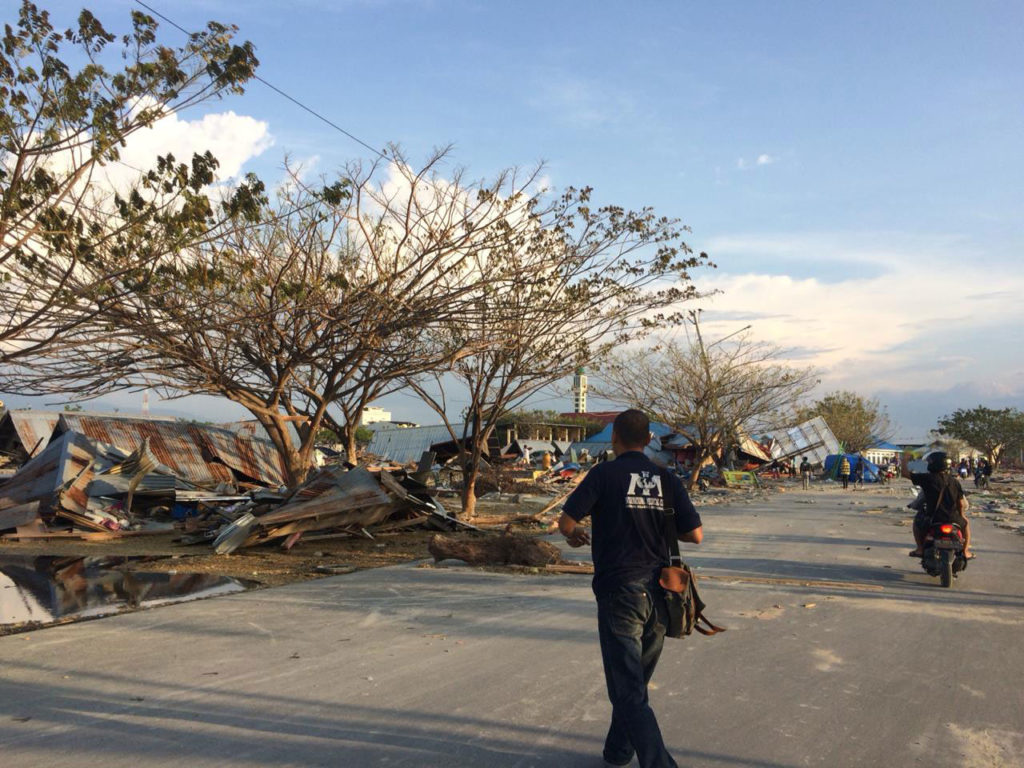
Indonesia Earthquakes & Tsunami
International Medical Corps’ emergency response team is on the ground in Indonesia to support response efforts following a series of powerful earthquakes that struck the Indonesian island of Sulawesi on Friday, September 28, centered about 35 miles northeast of Donggala and 50 miles north of Palu, which have a combined population of more than 600,000 people. The largest quake, a powerful magnitude 7.4, shook the region at 5:02 p.m. local time, triggering a tsunami that hit nearby coastlines. Indonesia’s National Board of Disaster Management (BNPB) estimates that 2.4 million people have been affected by the earthquake and tsunami, and man remain in need of shelter, clean water, food, fuel, medicines and medical personnel, and psychosocial support.
Thousands of houses and public facilities collapsed or were subsumed, killing more than 2,200 people, severely injuring almost 6,000, and displacing hundreds of thousands. Damage to roads, bridges and the airport in Palu, as well fuel shortages, continue to slow efforts to reach the most-affected areas.
Our emergency response team is in Palu and Jakarta assessing needs, mobilizing our network of partner organizations and implementing our response and recovery activities. We are coordinating with on-the-ground actors, governments and other agencies to provide shelter, mental health services and water, sanitation and hygiene services. Because of International Medical Corps’ deep experience in the country, we can quickly mobilize staff and assets across a range of sectors as further needs are identified.
International Medical Corps first deployed to Indonesia in 2000, when we established an emergency healthcare program in North Maluku. We then expanded to other areas following crises in Maluku, West and Central Kalimantan, Madura Island, North and Central Sulawesi, and North Sumatra. In 2004, International Medical Corps was among the first international relief organizations to reach Indonesia’s hard-hit Aceh region following the giant Indian Ocean tsunami. We provided a broad range of healthcare services—including emergency medicine, trauma surgery, and maternal and child health—in some of the worst-hit communities of that disaster, which claimed approximately 230,000 lives across the Indian Ocean region.
The situation remains fluid, so check back here often for more information—and to find out how you can help.
Frequently Asked Questions
-
How you can help earthquake and tsunami survivors in Indonesia
The best way you can help survivors in a disaster is by making a cash donation to an experienced organization that is working in the affected area. Unlike donations of clothing, blankets and other items, cash can meet any need, anywhere—it can buy generators, purchase medical supplies and quickly help get the right kind of assistance to the right place when it’s needed most. Any amount will make a difference, even in a large disaster where need is great.
International Medical Corps also accepts volunteer doctors and nurses to work in the field during a disaster response. You can see our volunteer opportunities here.
-
Has the government of Indonesia requested international assistance?
Yes, Indonesian President Joko Widodo has declared a state of national emergency, and the government of Indonesia made a formal request for international assistance.
-
What are the significant health concerns resulting from the earthquake and tsunami?
In addition to immediate emergency medical care needed for those injured by the earthquake and tsunami, there are significant health concerns that can arise in the aftermath of the destruction. These include:
- Lack of access to clean drinking water
- Medical care for injuries
- Lack of access to chronic medications
- Health risks from contaminated water and food supplies
- Exposure to insects, heat and other environmental hazards
- Outbreak of disease due to poor water, sanitation and hygiene conditions
- Mental health and psychosocial needs due to experiencing loss and/or horrific events
-
What disaster response support can International Medical Corps provide?
During a sudden-onset disaster, International Medical Corps can provide emergency medical relief—volunteer doctors and nurses, medical supplies, mobile medical clinics, and a modular, portable field hospital. We also work with local First Responders to support and help restore local health systems, which can be offline or significantly impaired after a natural disaster. A leader in the integration of mental health into general healthcare in humanitarian settings, International Medical Corps also provides guidance and training for First Responders, as well as mental health and psychosocial support for disaster survivors. As a global First Responder with almost 35 years of experience delivering emergency relief in difficult environments, we have the capacity to respond anywhere in the world—fast. We can have a team on the ground in less than 24 hours, and a fully functional field hospital set up in less than 72 hours.
-
How can I stay updated about this emergency?
The best way to stay updated is to sign up for our email updates. We’ll keep you informed about the situation on the ground, as well as progress that’s being made.